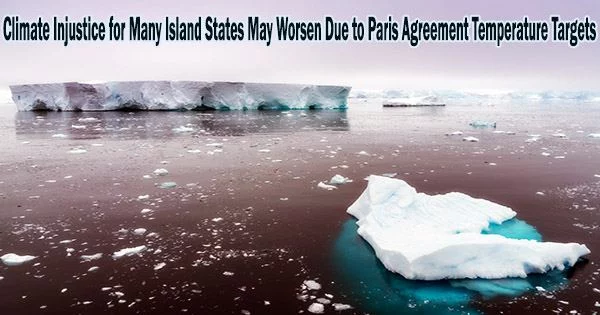Increased ice sheet meltwater poses an existential threat to the survival of island and coastal nations all over the world, while efforts are being made to keep the increase in global temperature to 1.5 to 2 degrees Celsius above the preindustrial average.
Recently published research from the University of Massachusetts Amherst in the journal Earth’s Future demonstrates that even the most optimistic temperature targets can result in catastrophic sea level rise, which has already started and will have an impact on low-lying countries for many generations to come.
An interdisciplinary team of researchers from the University of Massachusetts emphasizes that temperature alone is not a sufficient basis for climate policy, despite the fact that rising temperatures are having several negative effects on global ecosystems, the economy, and human wellbeing.
The researchers concentrated on the Antarctic Ice Sheet, which is melting at an accelerated rate while holding the biggest freshwater reserve in the world, enough to raise the oceans by 58 meters. However, even if global carbon emissions are reduced, the physics of the ice sheet itself also plays a role in its liquification, which will last for millennia.
It is also possible that the melting ice sheet may help preserve what is typically thought of as a “safe” level of warming, say 1.5 degrees, while actually allowing for disastrous sea-level rise. This is because melting ice can limit rising temperatures in the sky.
Temperature is not the only way to track global climate change. But it became the iconic metric in the Paris Agreement. Knowing that Antarctic melt can delay temperature rise while increasing sea levels, I wondered what it meant for climate justice. But climate science alone can’t answer that question of justice.
Shaina Sadai
Furthermore, the amount of sea level rise brought on by all that Antarctic meltwater won’t be the same everywhere. A disproportionate amount of the sea-level rise caused by melting Antarctic ice would affect some regions of the Caribbean Sea, Indian, and Pacific Oceans, up to 33% more than the average worldwide.
The Alliance of Small Island States (AOSIS), a grouping of 39 island and coastal countries worldwide, is particularly affected by this temperature-sea level difference.
Indeed, the authors of the research demonstrate that AOSIS countries are disproportionately affected by sea level rise despite producing a small amount of the planet’s human greenhouse gas emissions.
“Temperature is not the only way to track global climate change,” says Shaina Sadai, the paper’s lead author, who completed this research as part of her doctoral studies in geosciences at UMass Amherst, “but it became the iconic metric in the Paris Agreement. Knowing that Antarctic melt can delay temperature rise while increasing sea levels, I wondered what it meant for climate justice. But climate science alone can’t answer that question of justice.”
Here comes Regine Spector, a political science professor at UMass Amherst and a senior author on the report. In order to show how politically powerful countries influence international climate discussions and prolong historical patterns of colonial exploitation suffered by AOSIS states, Spector added knowledge in political power dynamics and the history of global inequality to the team’s work.
“Focusing on temperature misses other real consequences of climate change, such as sea-level rise, that are being felt all over the world today,” says Spector.
The team demonstrates how an interdisciplinary approach to research can be utilized to better understand the effects of international negotiations on climate justice and the connections between science, policy, and political power. The team focuses their research on the experiences of AOSIS countries.
“We need to listen to the voices of the people facing the vanguard of climate change,” say Sadai and Spector.
They hope this research can serve as a model for future studies. This research was funded by the National Science Foundation and NASA.





